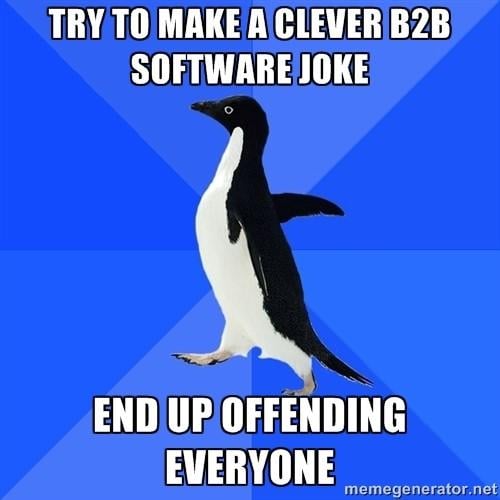Do you want your content to be unforgettable? Do you want parents to pass on your blog posts to their children, and your white papers to their grandchildren? Of course you do! And the solution is simple – make your content hilariously, milk-exploding-from-nostrils funny. All right, maybe your creations won’t earn a place in the family hope chest, but a touch of comedy will greatly improve any content piece’s shelf life.
News bloggers can write as many as six articles a day, and while those articles may generate tons of views, they tend to go in one ear and out the other. Most readers won’t remember that article next week, never mind who wrote it.
The truth is, if you want to be memorable, you need to be funny. You gotta make ‘em laugh!
A Spoonful of Comedy Makes Dry Content Go Down
Those in the B2B content marketing industry tend to have it harder than most. Most B2B solutions don’t exactly evoke spine-tingling sensations and tend to be as far from “sexy” as Jabba the Hutt. I mean we’re not selling iPhones here, we’re selling cloud data storage services, PPC management solutions, and lead tracking software. No one is staying up at night fantasizing about the rockin’ B2B lifestyle.
However, with a little creative thinking, even businesses that are generally considered dry can interject humor into their content – and you can bet they’ll be better off for it. Humor can make otherwise unbearably dull content enjoyable, establish your content in a viewer’s mind, and can help develop your unique brand identity.
There are some great examples of this today happening. The Geico gecko made insurance adorable, and Allstate’s Mayhem character put an unlikely face to everyday mishaps.
Probably the most impressive example of comedy in an otherwise dull business comes from Epuron, a European clean energy company.
You wouldn’t think it possible to get emotional about wind, but this promotional film does just that. The ad even won gold at Cannes in 2007, and earned many other honors and awards.
That’s all well and good, but how can you add humor to your own business? The best strategy is start with your customers’ pain points and work backwards from there.
Do your clients feel overwhelmed by vast quantities of data? Consider going with a “too much of a good thing” real world comparison – maybe one trip to Disney World is great, but if you had to go every day you’d end up punching all the mascots and gorging yourself on cotton candy.
But is Comedy Right for My Business?
The short answer is yes.
Oh, you want the long answer? OK then. Well, it’s understandable for some business to be hesitant about providing comedic relief, especially for large corporations with a professional reputation to uphold. A pie in the face doesn’t exactly scream “trust me with all your money.” Historically, larger companies have worried that humor reflects a lack of professionalism and will make customers question the trust and reliability of your offerings. However, this has been less true in recent years as many businesses, startups especially, have developed a more relaxed and casual rapport with their customers.
Approachability and authenticity are replacing stiff tie sophistication and intimidating authority. Modern customers appreciate a business’s candor. The latest marketing best practices highlight the necessity of relationship-building, and a well-placed joke does more to further a customer’s connection to a brand than undecipherable industry jargon.
That being said, there’s a time and a place for jokes. Not every situation necessitates a laugh. If your business is responsible for managing school trips and study abroad programs, you probably don’t want to make jokes about children getting kidnapped or encountering bodily harm. However, a joke about parents being overwhelmed by a flood of Instagram pics during a child’s trip will probably go over well.
Aspiring Stooges Be Warned
I offer a word of warning to those embarking on their epic journey into the rich and fertile lands of comedy. The best jokes tend to push the line, so it’s tempting to walk close to the edge. Beware though – one wrong move and you could step on a landmine. A landmine full of ill will and hateful tweets.
There’s always a risk in comedy of offending people (e.g. South Park). A poorly timed joke could mean accidentally upsetting a lot of people. It’s almost always a bad idea to piss off your customers, so tread lightly friends. Keep the risks in mind when deciding how far you want to go for a laugh.
This isn’t to say you should always play nice – controversy can get you a ton of notice (and traffic), but reaping the rewards requires that you also have thick skin to withstand the virtual tomatoes and fish bones you may find being hurled your way.
All the World’s a Stage
How do you know you’ve made unforgettable content? Oh don’t worry, they’ll tell you. You’ll see your content being shared, commented on, and delivering mega-traffic.
So go forth online jesters, demonstrate your superior wit and comedic excellence to the world. You and your customers will be better for it.










